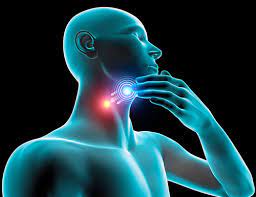Neck Cancer
Each year, numerous individuals encounter a diagnosis of cancers affecting the neck, a sensitive and critical region involving vital glands, lymph nodes, and tissues essential to overall well-being. At the Cancer Clinic, our comprehensive and advanced treatment options ensure targeted care, rapid recovery, and enhanced quality of life.
We offer cutting-edge diagnostic, surgical, and supportive care services, empowering our patients throughout their treatment journey.

Types of Neck Cancer
1. Laryngeal (Voice Box) Cancer
- Persistent hoarseness or voice changes
- Difficulty breathing or swallowing
- Persistent sore throat or cough
- Lump sensation in the throat
- Bleeding
2. Pharyngeal (Throat) Cancer
- Chronic throat pain or irritation
- Difficulty swallowing
- Ear pain or persistent discomfort
- Lump or mass felt in the neck
- Bleeding
3. Hodgkin's and Non-Hodgkin's Lymphoma
- Swollen, painless lymph nodes
- Unexplained weight loss and fatigue
- Persistent fever or night sweats
- Shortness of breath or chronic cough
4. Salivary Gland Cancer
-
- Swelling or lumps in the neck or facial region
- Persistent pain in the facial area
- Facial numbness or muscle weakness
- Difficulty swallowing or opening the mouth
5. Cervical Esophageal Cancer
- Difficulty swallowing (dysphagia)
- Pain or discomfort in the throat
- Persistent cough or hoarse voice
- Weight loss or nutritional deficiencies
6. Skin Cancers of the Neck (Melanoma and Squamous Cell Carcinoma)
- Changing or unusual skin lesions
- Bleeding, crusting, or persistent sores
- Skin discoloration or rapid lesion growth
- Itching or tenderness at affected area
Diagnosis Methods
- Physical Examination
- Imaging Techniques (CT, MRI, PET scans)
- Endoscopic Procedures
- Ultrasound-guided Fine Needle Aspiration Biopsy
- PET Scan when indicated
Treatment and Outlook
At our clinic, personalized care involves targeted surgery, radiotherapy, chemotherapy, immunotherapy, and targeted biological treatments.
Our comprehensive care includes supportive measures such as:
- Organ preservation procedures to preserve speech and swallowing.
- Speech and swallowing rehabilitation
- Nutritional and dietary support
- Psychological counseling
- Postoperative rehabilitation services
Early Diagnosis and Prevention
Early detection significantly improves outcomes. Regular screenings and prompt medical attention for suspicious symptoms or lumps are essential.
Preventive Measures:
- Dental Care for sharp teeth and ill fitting dentures.
- Regular neck examinations and health check-ups
- Avoiding tobacco (both smokeless and smoking.)
- limiting alcohol intake
- Healthy lifestyle and balanced diet
- HPV vaccination where indicated
Neck Nodes Management
Effective management of cancer spreading to the neck lymph nodes is vital for optimal patient outcomes. Accurate assessment and timely intervention significantly reduce cancer recurrence risk. Techniques and Approaches:- Neck Dissection Surgery: Surgical removal of affected lymph nodes in the neck to control local cancer spread. Both conservative and radical dissection techniques are employed, with careful attention to preserving function and maintaining a favorable cosmetic appearance.
- Radiation Therapy: High-energy radiation precisely targets and destroys cancer cells.
- Combined Modality Treatments: Integrated approaches using surgery, chemotherapy (neo adjuvant / adjuvant chemotherapy) and radiotherapy for advanced disease management.
- Greater surgical precision
- Reduced scarring and faster recovery
- Lower risk of complications
